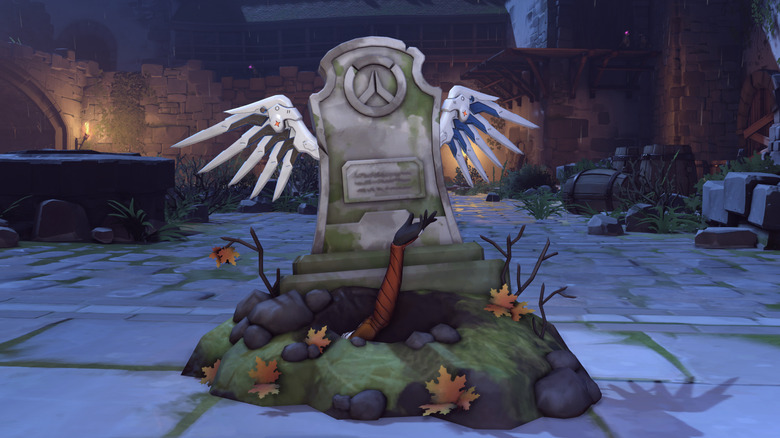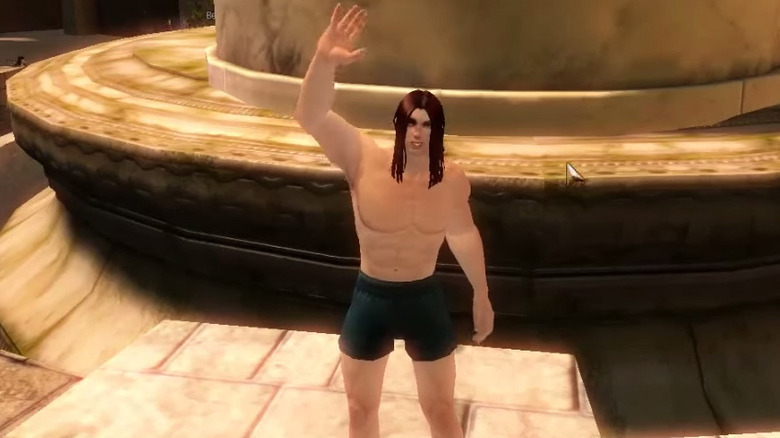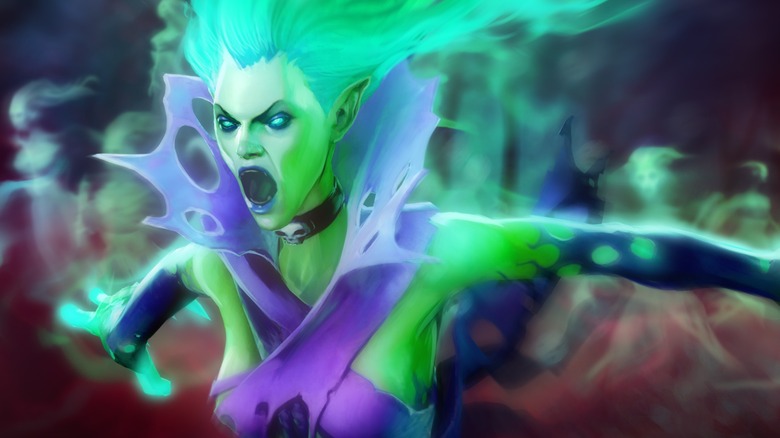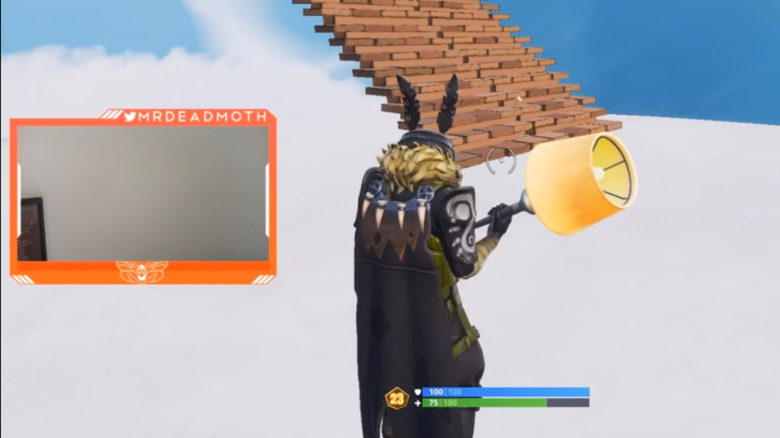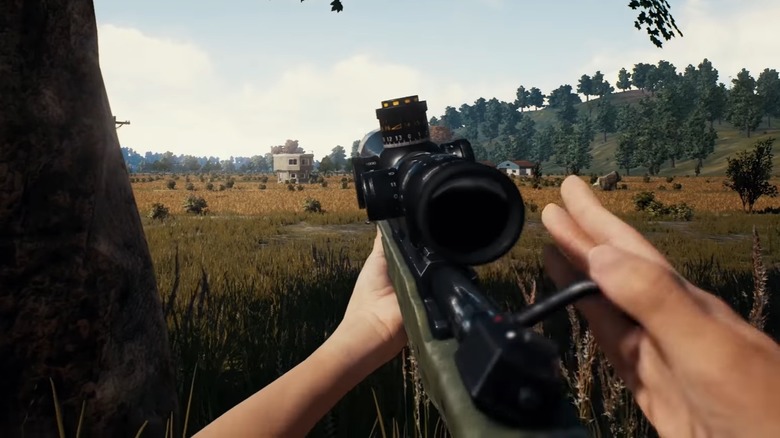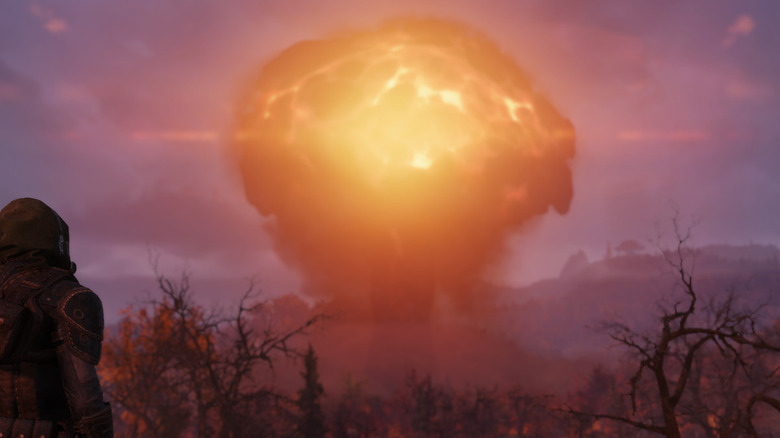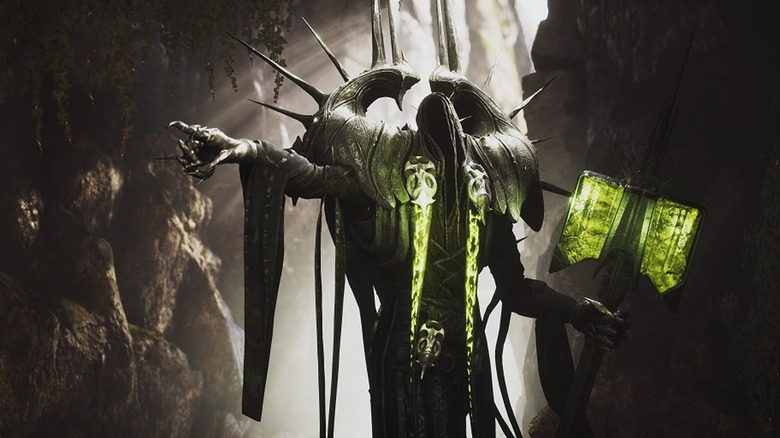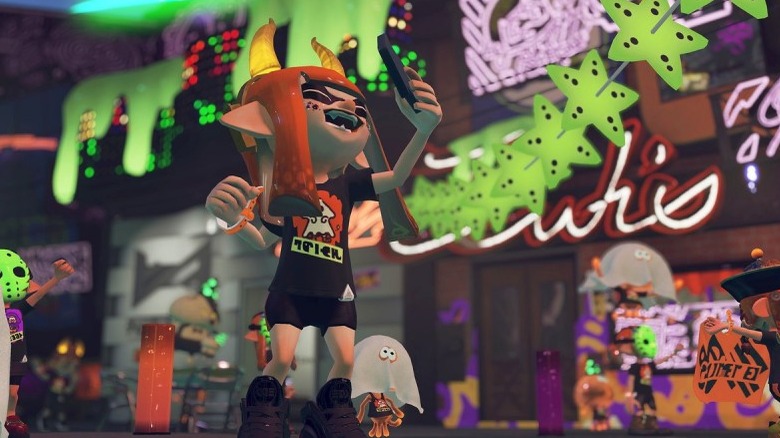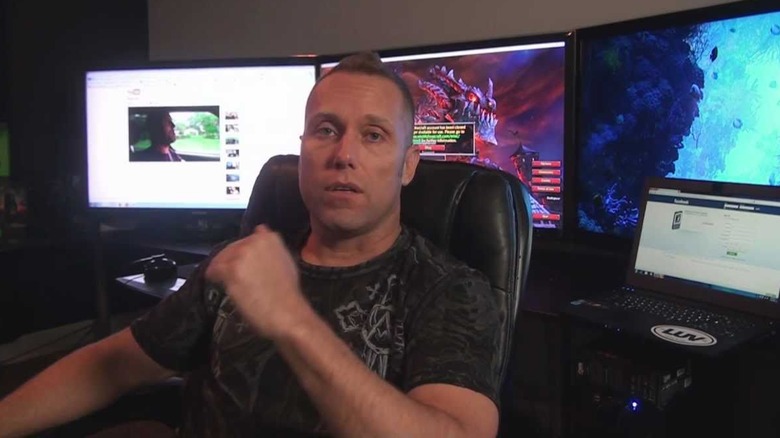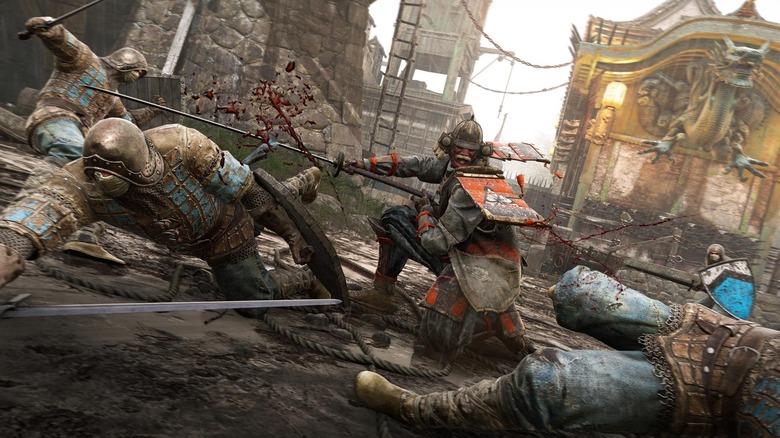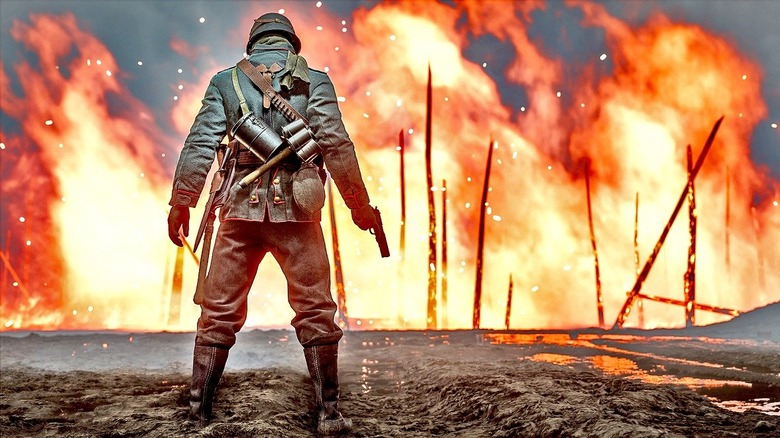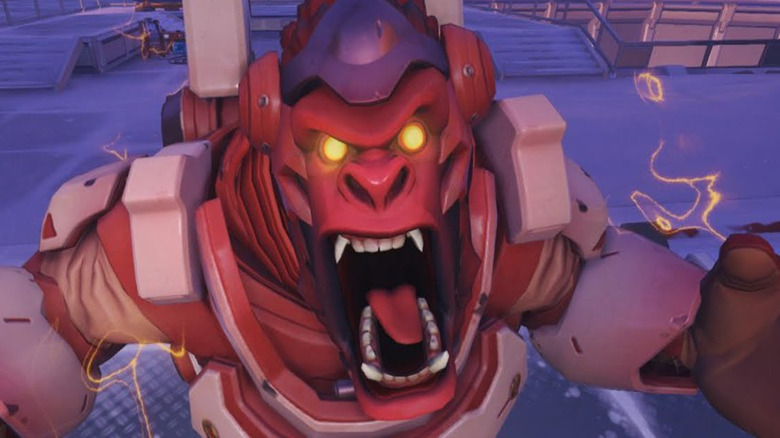The Controversial Reasons These Gamers Got Banned
Not everyone in the video gaming community can play nicely. Sometimes, when a troublemaker is ruining the fun for everyone else, it's time for the folks running these games to step in with a suspension notice or an outright ban for whoever is causing trouble. This is usually received with relief from the other players, and everyone goes on with their lives. That just means there's one less troll to muck up everyone else's fun time, right?
Well, every once in a while, it's not quite that simple. There have been cases where the details of a specific ban are more upsetting than others. Occasionally, the ban is revealed to be unjust, or even just an honest mistake on the part of the developers. Sometimes, the reasons behind the ban are just plain weird. Whatever the circumstances, the following cases carried a bit more controversy with their swings of the banhammer.
Guild Wars 2 hacker has their character publicly stripped and killed
This one is not only notable for the ban, but also for how the game's creators chose to carry it out. In this case, Guild Wars developer ArenaNet decided to make an example out of one particular hacker.
After multiple Guild Wars 2 players complained about a hacker who had been making their lives miserable over the course of a few weeks, Guild Wars 2's Security Lead took control of the hacker's character. What followed was essentially the online gaming equivalent of a public humiliation and execution. The hacker's character was stripped of his clothes and forced to walk off of a cliff, waving goodbye to the rest of the Guild Wars 2 community. The only things missing were tar and feathers.
Some Guild Wars 2 players felt like the ban was appropriate, but that the way it was done was pretty messed up. One user criticized ArenaNet's actions, saying, "This to me shows just how amateurish these jokers are ... This isn't going to stop anyone from cheating ... Talk about childish."
Racist comments in Dota 2 lead to a real-life ban
After Dota 2 player Kuku made racist comments in a chat, Valve made the decision to ban Kuku from attending a Chinese Dota 2 tournament, the Chongqing Major. Things only got more intense after that. Kuku's team, TNC Predator, tweeted that they'd been informed of even greater consequences awaiting them if Kuku attempted to participate in the Major. "The city government will possibly cancel the tournament should he attend," claimed TNC Predator. "The organizers will not be able to guarantee his safety should he attend."
A post on the official Dota 2 blog regarding the ban read, "Players and teams will make mistakes in the future, and they should accept responsibility for them. We want there to be opportunities to learn from their errors, but taking responsibility doesn't mean making mistakes don't come with a cost." The post went on to claim that Kuku had, to their knowledge, not actually been banned by the Chinese government.
However, following Kuku's suspension, it came to light that he had in fact been banned by Chongqing's city government. Responding to this news in a Reddit thread, one of Valve's employees said that while they knew the city officials were concerned with some backlash, "there was no official player ban communicated to us and discussions were still open on ways to handle it or improve the situation."
All in all, this is a case that gets more complicated the longer one looks into it.
Domestic violence caught during Fortnite stream
Luke Munday, aka MrDeadMoth, a noted Fortnite streamer, landed himself in a lot of trouble when viewers of his Twitch channel overheard some disturbing things in one of his livestreams. As thousands of viewers watched his channel, he stepped away from his camera and could allegedly be overheard assaulting his pregnant partner in front of their children, who could also be heard crying. Prior to this incident, Munday had been previously charged for "malicious damage and common assault."
Though Munday was banned from Twitch after many concerned viewers brought the incident to their attention, Twitch drew the anger of many users when they rescinded the ban not long after. Between the fan backlash and the comments from people coming out of the woodwork to defend Munday's actions (which Twitch likely wanted to distance themselves from), this was clearly turning into a real mess for Twitch.
Twitch ultimately decided to re-ban Munday's account. Twitch then issued a statement to The Verge, which said, "Protecting the integrity of our community is incredibly important to us. We want everyone on Twitch to have a safe and positive experience and work constantly toward that goal."
While it seems to have been resolved (at least where Twitch is concerned), the whole situation is ugly.
Banned from PUBG for stream sniping (or maybe not?)
Stream snipers, as described by Polygon, "are those who watch a Twitch stream of a game while playing it themselves to get a read on where another player is so that they can go take them down." In 2017, PlayerUnknown's Battlegrounds player Lotoe was banned from the game for a week after he allegedly did that very thing to a streamer who goes by Shroud. Seems pretty cut and dry, right? Well, according to a statement Lotoe made to Polygon, he doesn't even watch Twitch. He simply happened to be in the right place at the right time, but had the bad luck of being seen by the PUBG team.
This incident went on to be the subject of quite a bit of debate in the PUBG community, with PCGamesN referring to the whole back-and-forth as "a bit he-said, she-said." Constant bickering and accusations between Lotoe and the official subreddit (wherein Lotoe also received quite a bit of support) eventually led to PlayerUnknown himself, Brendan Greene, releasing a statement on Twitter. In this statement, he admitted that his team couldn't prove whether or not Lotoe had been watching the Twitch stream in question. However, he went on to add, "We can see no other reason why [Lotoe] would consistently attempt to be in the same lobby as someone who is broadcasting live other than to have an advantage in the game."
Homophobic harassment leads to multiple Fallout 76 bans
Three Fallout 76 players earned a ban when they harassed and killed a fellow player's character while shouting homophobic slurs. While we won't be repeating any of the offensive language here, it was graphic enough that, although the aggressors were initially banned for three days while Bethesda investigated the incident, the decision was eventually made to permanently ban them.
When speaking to Eurogamer, NathanTheHicc, the attacker who notably uploaded his own footage of the incident to his personal YouTube channel, showed zero remorse for his part in the controversy. "It was just a late night of having fun and after the first encounter (seen on my channel) we felt it would be fun to offend them somehow," NathanTheHicc said via email. He also said, "I will not apologise given the opportunity."
The entire incident has made it pretty clear that Fallout 76 desperately needs some kind of dedicated reporting system. It should be noted that 76 does have a solid "anti-griefing" mechanic, which punishes gamers for killing players that didn't want to fight by slapping them with a bounty and a big red mark on the map. However, there isn't a way for Fallout 76 players to actively report a fellow gamer.
As mentioned by the victim of the attack, "Reporting in-game is necessary. Simply blocking someone from a session is only temporarily protecting yourself, but not stopping anything from happening again or to other people."
Banned from Paragon for being a terrorist ... except for one problem
In a ban that looks extremely embarrassing on the part of Epic Games, player Muhammad Zakir Khan was unjustly banned when he signed up for a beta of Epic's multiplayer game Paragon. "Initially, I thought I had been hacked," Khan told Gamasutra.
As explained by Slate, the automatic ban notice received by Khan was triggered because his name resembled the name of someone on a terrorist watchlist. The problem was, this was the wrong guy. Khan responded to the ban notice by sharing a screenshot of it to Twitter, saying, "@EpicGames My name is Khan and I am not a terrorist. #Islamophobia."
This attracted considerable attention from fellow gamers, as well as Epic Games' founder Tim Sweeney, who responded, "Sorry, this isn't intended. We're working to fix ASAP." Sweeney went on to explain that the issue was due to an "overly broad" security filter. Still, it's hard to imagine how that must have felt for Khan to be blocked for seemingly no reason other than his name.
In order to defeat the cheaters, one must BECOME the cheaters
Imagine if Batman decided to start using killer laughing gas, just to try to somehow prove to the Joker that it wasn't cool? That's essentially the thought process behind our next ban.
As reported by Eurogamer, one player took it upon themselves to raise awareness of hackers and cheaters running rampant in Splatoon 2's online multiplayer. Naturally, he accomplished this by hacking the leaderboards of the popular game, altering the top players' power levels and using their rank listings to display a message that said, "Please Add Anti Cheat."
This had already drawn Nintendo's attention, but it wasn't long before the hacker revealed himself on Reddit. His username? PleaseAddAntiCheat, naturally. He explained, "Nintendo, you're welcome to ban my console any time. My purpose was to call attention to the current issue that plagues the game, and I've done that. But my message is, please make protecting your players the top priority."
Needless to say, PleaseAddAntiCheat eventually updated his thread to let folks know that he had indeed been banned. Hopefully, though, this is a case where he made his voice heard, and perhaps Nintendo will take this as a sign to look further into the security gaps in Splatoon 2.
Swifty breaks World of Warcraft
Back in 2011, Blizzard upset quite a few fans with a number of bans that were all related to the same event. Noted World of Warcraft streamer Swifty had attracted a massive number of players during one of his livestreams. This wasn't unusual, due to Swifty's large following. However, the sheer number of players in one place, coupled with the usual spamming of emotes that usually come when someone sees their character on a stream (the gamer equivalent of "HI, MOM!"), caused one of Blizzard's servers to crash. Blizzard responded by banning Swifty and several other players.
Blizzard community manager Micah Wipple, aka Bashiok, attempted to explain what happened (via Engadget): "We recently monitored a situation where a large number of players intentionally disrupted access to multiple realms by gathering together and mass-spamming game emotes. In some cases, individual players spammed an emote upwards of 30,000 times. As a result, some accounts found to be active participants in this activity were permanently banned."
Despite this statement, fan outcry led to Blizzard restoring Swifty's account, after which Swifty took to YouTube to thank all of his fans for all of the support. While Blizzard's action in this situation is understandable, it may have made more sense for them to simply suspend the accounts involved. while they looked into the situation, rather than jumping right to banning people.
Banned from For Honor (for no reason)
Shortly after the release of Ubisoft's action game For Honor, there were numerous reports of gamers receiving ban notices for seemingly no reason. According to Kotaku, these bans were the result of a program called EasyAntiCheat, which was apparently sensing the use of hacks when there weren't any.
As Kotaku points out, however, some of the banned players were technically within a bit of a gray area. One gamer was using third-party software to aid his second campaign playthrough and found himself banned as a result. Even so, this shouldn't be a problem for the community at large, since the single-player campaign is offline; it's not as though this player was using cheats in an online match. Imagine if your NES console had banned you for using a Game Genie to get some extra lives.
None of that explains how one player managed to be banned without even owning the game. In a Reddit thread, this player explains that he played the beta version of For Honor, but never purchased the full game. He still somehow received a ban notice from Ubisoft, leading to one commenter hilariously theorizing that Ubisoft employs "time cops to enforce the rules" against cheating.
Punished for being WAY too good at Battlefield 1
As Kotaku explains, FairFight is a system used by the games in the Battlefield series that was built to check for gameplay that doesn't seem quite right. In other words, "When the system detects gameplay that is statistically unlikely, it checks for events it deems improbable. If it detects this, the player in question is banned."
This sounds excellent in theory, but several Battlefield 1 players reported unjust bans. Kotaku mentions SpartanHopeLight, a Battlefield 1 player slapped with a ban after managing a 202 kills to 8 deaths in an online match. In other words, he was banned because he played the game so well that FairFight figured he had to be cheating.
Another banned Battlefield 1 player, who goes by kl-Spazmo, helped bring the issue to the gaming community's attention by (how else?) posting about it on Reddit. As explained by Tech Times, kl-Spazmo and his friends received temporary suspensions doled out by FairFight, then a permanent ban. Though kl-Spazmo reached out to EA's customer support, he remained banned. However, his story and others like it led to EA and Battlefield developer DICE finally investigating the claims. Hopefully the kinks have been worked out for future Battlefield players, who won't have to worry about being too dang good.
Blizzard's toxicity bans smack down innocent Overwatch players
It's hard to argue that a ban for toxic behavior isn't well deserved. People just want to have fun without being bombarded with negativity. As Blizzard explained to Kotaku, "We take toxicity seriously and take appropriate steps to monitor, and we validate claims regardless of how it is brought to our attention." This included monitoring gameplay videos on YouTube for signs of unsportsmanlike behavior, which meant that players could be banned without first being reported by other players.
This has resulted in some backlash from the gaming community, with one concerned gamer accusing Blizzard of overstepping their bounds: "This is too far ... You may do nothing wrong in-game, and still get banned. Nobody reported you, they just watch your every move on social media."
While this may at first seem like an overreaction, it should be noted that Blizzard has not been shy about dropping the banhammer in the past over concerns of toxicity. In fact, over 18,000 players were suspended from the game in South Korea alone for violating Blizzard's anti-toxicity policies. On the flip side, a formerly toxic player has shared that his own ban caused him to reevaluate his behavior, and he has changed his attitude following a discussion with a Blizzard moderator. Despite the controversy, stories like this one prove that there is real merit to Blizzard's toxicity bans.

